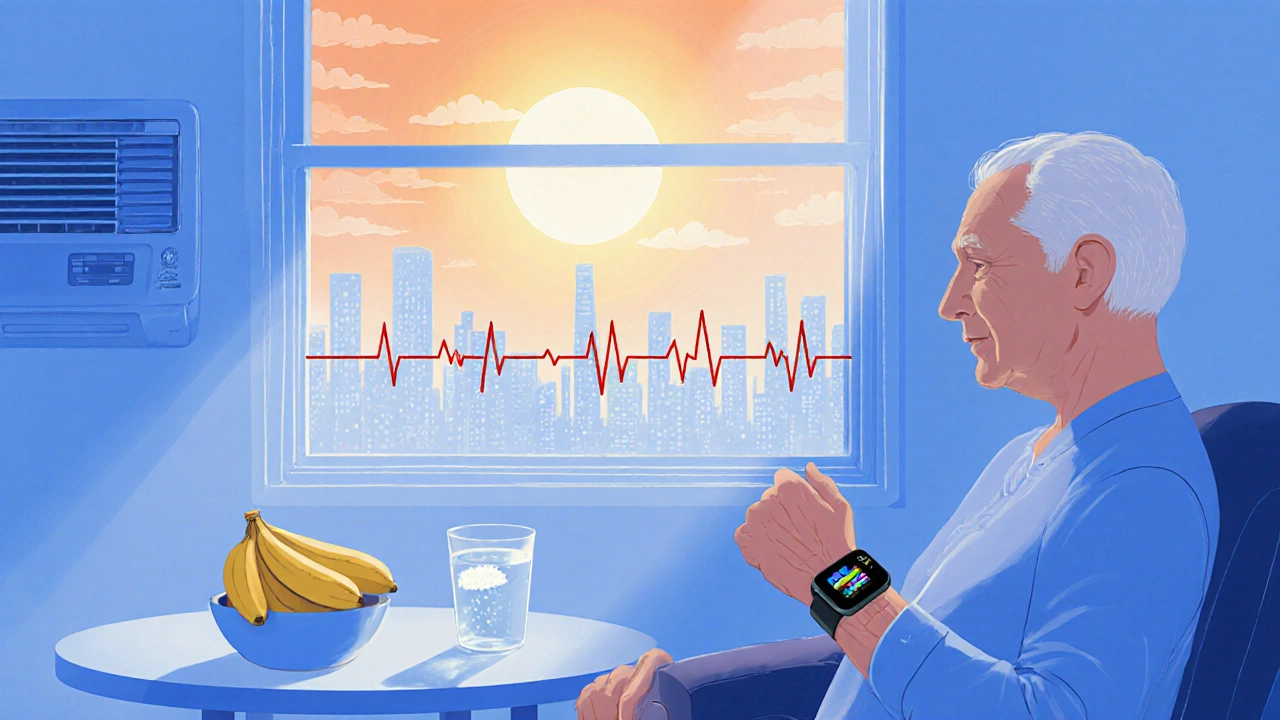 Oct, 7 2025
Oct, 7 2025
Climate Change & Heart Rhythm Risk Calculator
Personal Risk Factors
Answer these questions to estimate your risk of climate-related heart rhythm issues.
Your Estimated Risk Level
When you hear the phrase climate change heart rhythm is a growing health concern that links rising global temperatures and pollution to irregular heartbeats, you might wonder how weather could mess with the beat of your heart. The short answer: hotter days, polluted air, and shifting weather patterns strain the cardiovascular system, trigger electrolyte swings, and spark autonomic nervous system glitches that turn a steady pulse into a wobble.
Why the Heart Beats Faster in a Warming World
At its core, the heart rhythm is a pattern of electrical impulses that tell the heart when to contract and relax. When you step into a heat wave, your body tries to cool down by dilating blood vessels and sweating. This forces the heart to pump more blood to the skin, raising the resting heart rate by 5‑15 beats per minute on average (data from the European Society of Cardiology, 2024). The higher demand can expose hidden conduction problems, especially in older adults or people with existing arrhythmia is a disorder where the heart's electrical system fires out of sync.
Air Pollution: The Silent Arrhythmia Trigger
Beyond heat, air pollution is a mix of particles and gases like PM2.5, ozone, and NO₂ that irritate lungs and enter the bloodstream. Studies from the WHO Climate Report (2023) show a 12% rise in emergency department visits for atrial fibrillation on days when PM2.5 exceeds 35µg/m³. The mechanism? Inhaled particles promote inflammation, raise sympathetic nervous system tone, and shift electrolyte balances-perfect storm for irregular beats.
Electrolyte Imbalance and Dehydration
Heat and sweat drain sodium, potassium, and magnesium, the minerals that keep cardiac cells firing correctly. A 2022 clinical trial of marathon runners found that a 5‑mmol/L drop in serum potassium doubled the odds of premature ventricular contractions during a race. The same principle applies during prolonged heat waves: dehydration leads to low potassium, which prolongs the QT interval and makes ventricular tachycardia more likely.

Autonomic Nervous System: The Body’s Weather Sensor
The autonomic nervous system is a network that controls involuntary functions like heart rate, digestion, and temperature regulation. Climate stress shifts the balance toward sympathetic dominance (the “fight‑or‑flight” mode). Heart‑rate variability (HRV) - a non‑invasive marker of autonomic health - drops sharply when temperatures rise above 30°C, indicating reduced parasympathetic buffering and a higher risk of tachyarrhythmias.
Who Is Most at Risk?
- People over 65 with pre‑existing hypertension or coronary artery disease.
- Individuals on diuretics or beta‑blockers that already influence electrolyte levels.
- Those living in urban hotspots where heat islands and traffic‑related air pollution combine.
- Athletes and outdoor workers who spend hours in the sun without adequate hydration.
Practical Steps to Guard Your Rhythm
- Stay Hydrated, but Choose Electrolyte‑Rich Fluids. Water with a pinch of salt or sports drinks can keep sodium and potassium in the right range.
- Monitor indoor temperatures. Use fans or air‑conditioning during heat spikes; aim for indoor temps below 24°C.
- Check local air‑quality indexes. On high‑pollution days, limit outdoor activity or wear a certified N95 mask.
- Schedule regular check‑ups. A simple 12‑lead ECG or wearable ECG patch can catch early signs of atrial fibrillation.
- Maintain a balanced diet rich in potassium (bananas, leafy greens) and magnesium (nuts, seeds) to offset sweat losses.

Comparing Heart‑Rate Effects: Normal vs. Heat‑Wave Conditions
| Ambient Temperature | Average HRV (ms) | Resting Heart Rate (bpm) | Arrhythmia Risk ↑ |
|---|---|---|---|
| 15‑20°C (Comfort Zone) | 55‑70 | 65‑70 | Baseline |
| 25‑30°C (Warm Day) | 40‑55 | 75‑85 | 1.5‑2× |
| >30°C (Heat Wave) | 25‑40 | 90‑105 | 3‑4× |
Future Outlook: Climate Policy and Cardiac Health
Health agencies are now recognizing that climate mitigation is also heart‑health protection. The UK National Health Service (NHS) 2025 Climate Action Plan includes a “Cardiovascular Resilience” module that encourages hospitals to track temperature‑related arrhythmia spikes and to develop rapid‑response cooling protocols for vulnerable patients.
Frequently Asked Questions
Can hot weather cause a heart attack?
Heat raises heart rate and blood viscosity, which can strain coronary arteries. For people with existing blockages, a sudden temperature surge can indeed trigger a heart attack.
Is atrial fibrillation more common during summer?
Epidemiological data from the US Nationwide Inpatient Sample (2022) show a 9% rise in atrial‑fibrillation admissions in July‑August compared with winter months, correlating with higher ambient temperatures.
What role does air quality play in ventricular arrhythmias?
Fine particulate matter (PM2.5) can infiltrate the bloodstream, causing oxidative stress that destabilizes cardiac cells. A 2021 European cohort study linked a 10µg/m³ increase in PM2.5 to a 14% rise in ventricular ectopy.
Should I change my medication during a heat wave?
Talk to your doctor. Some diuretics increase fluid loss, so dosage adjustments might be needed. Never alter medication on your own.
How can I monitor my heart rhythm at home?
Wearable ECG patches or smart watches with validated rhythm‑detection algorithms can alert you to irregular beats. Pair them with a symptom diary for the best clinical picture.
Jill Brock
October 7, 2025 AT 14:03Heat waves are basically heart‑attack time travelers.
Ellie Chung
October 8, 2025 AT 05:37Whoa, this article just slammed the reality of climate change straight into my chest!
It’s wild how a scorching summer can crank up your resting heart rate by ten or fifteen beats.
And don’t even get me started on those sneaky PM2.5 particles that sneak into your bloodstream and turn your ticker into a jittery mess.
Honestly, if you’re anyone over 50 and you think a little sweat is just a summer thing, think again – your heart is screaming for help.
Grab a sports drink, stay in the shade, and maybe consider a mask on those polluted days.
Bottom line: the planet’s heating up and so is the pressure on our arteries.
Sophia Simone
October 8, 2025 AT 21:10While the dramatics are entertaining, the piece glosses over the robust body of epidemiological evidence that actually quantifies risk.
For instance, the cited 12% rise in atrial fibrillation visits lacks adjustment for confounding seasonal variables.
Moreover, the suggested “electrolyte‑rich fluids” are presented without any acknowledgment of the renin‑angiotensin‑aldosterone system’s role in hypertensive patients.
In short, the article is a superficial overview masquerading as a comprehensive guide.
Juan Sarmiento
October 9, 2025 AT 12:43Great read! I love how the author breaks down the science into bite‑size tips we can actually use.
If you’re feeling the heat, a quick sip of a banana‑smoothie can boost potassium fast.
And seriously, those indoor temp hacks (keep it under 24°C) are a game‑changer for anyone with a history of arrhythmia.
Stay cool, stay alive, folks!
Patrick McVicker
October 10, 2025 AT 04:17👍 Totally agree with Juan!
Just add: set a reminder on your phone to drink electrolyte water every hour when it’s >30°C.
And don’t forget to check the AQI app before heading out – a quick glance can save you a night in the ER.
Liliana Phera
October 10, 2025 AT 19:50The way climate change sneaks into our cardiac wiring is both terrifying and fascinating.
When temperatures climb, our bodies push the limits of thermoregulation, forcing the heart to work overtime.
This extra workload can unmask latent conduction anomalies that were sleeping under cooler conditions.
Inflammatory pathways triggered by heat also meddle with the delicate electrolyte balance that powers each heartbeat.
A drop in potassium or magnesium, common during sweaty days, stretches the QT interval and heightens arrhythmia risk.
Meanwhile, polluted air adds a toxic layer by delivering fine particles straight into the bloodstream.
Those particles spark oxidative stress, which in turn agitates the autonomic nervous system.
The autonomic shift tilts toward sympathetic dominance, a state where heart‑rate variability collapses.
Low HRV is a well‑known harbinger of irregular rhythms, especially atrial fibrillation.
Older adults, who already have stiffer vessels, feel the pressure even more acutely.
Diuretic‑using patients face a double‑edged sword, losing both fluid and electrolytes in the heat.
Urban heat islands turn city blocks into persistent ovens, amplifying the problem for millions.
Outdoor workers and athletes who stay in the sun for hours are essentially gambling with their cardiac stability.
The good news is that simple interventions-hydration with electrolytes, cooling strategies, and air‑quality monitoring-can blunt the worst effects.
But the real solution lies in aggressive climate policies that reduce heat extremes and clean the air we all breathe.
Dean Briggs
October 11, 2025 AT 11:23Dean here – I’m blown away by how thorough that explanation was.
It ties together the thermoregulatory response, electrolyte shifts, and autonomic imbalance with a clarity you rarely see in popular health articles.
What struck me most is the emphasis on electrolyte‑rich fluids; many of us overlook potassium and magnesium in the rush to stay hydrated.
The urban heat island point is also spot‑on – city planners need to consider cardiovascular health when designing green spaces.
Overall, a masterclass in connecting climate science to everyday medical practice.
Sadie Speid
October 12, 2025 AT 02:57Let’s get moving, people! The heat isn’t an excuse to slack off – it’s a cue to fuel up with electrolytes and keep your cool zones active.
Set a timer, drink a little electrolyte water every 30 minutes, and take a 5‑minute shade break every hour.
You’ll thank your heart later!
Sue Ross
October 12, 2025 AT 18:30I’m curious about the exact thresholds for HRV drops – the article mentions a sharp decline above 30°C, but does it differ by age group?
Also, are there specific wearable metrics that can reliably alert someone before an arrhythmia event?
Rohinii Pradhan
October 13, 2025 AT 10:03While the inquisitive points are valid, the literature actually shows a graded HRV response where younger cohorts retain higher variability up to 35°C.
For wearables, a validated ECG patch with a sampling rate of at least 250 Hz is required to flag premature ventricular contractions with acceptable sensitivity.
Thus, generic smartwatches may miss subtle changes that a clinical‑grade device would catch.
Anna-Lisa Hagley
October 14, 2025 AT 01:37Honestly, this article feels like a feel‑good pamphlet rather than a rigorous analysis.
The claims about “simple interventions” ignore socioeconomic barriers many face in heat‑stricken neighborhoods.
It’s a classic case of tech‑savvy optimism without a reality check.
A Walton Smith
October 14, 2025 AT 17:10Just read it. Too much fluff. Need straight facts.
Theunis Oliphant
October 15, 2025 AT 08:43Ah, the quintessential lazy critique! One might argue that brevity is the soul of wit, yet the article’s paucity of depth belies its grandiose headlines.
In my estimation, a more erudite discourse would have encompassed the nuanced interplay between thermoregulation and electrophysiology, replete with quantitative metrics.
India Digerida Para Occidente
October 16, 2025 AT 00:17From a peacemaker’s perspective, I appreciate the call for balanced lifestyle adjustments while urging systemic policy change.
It’s crucial we foster community awareness without stigmatizing those already vulnerable to heat stress.
Andrew Stevenson
October 16, 2025 AT 15:50Andrew here – great points, especially the emphasis on “Cooling Protocols” in hospitals.
Implementing wearable telemetry in high‑risk wards could shave minutes off response times during heat spikes.
Let’s champion that tech adoption!
Kate Taylor
October 17, 2025 AT 07:23Thanks for the solid advice, team! I’ll be swapping my plain water for electrolyte drinks during the next heatwave.
Also, setting my thermostat a few degrees lower tonight should help keep my heart steady.
Hannah Mae
October 17, 2025 AT 22:57i dont think we need all the hype about climate making hearts go bcause the science isnt as clear as u think.
Iván Cañas
October 18, 2025 AT 14:30It’s fascinating how cultural habits-like ice‑water consumption in some regions-intersect with physiological responses to heat.
Balancing formal medical guidance with informal community practices can bridge the compliance gap.
Jen Basay
October 19, 2025 AT 06:03👍 Totally agree with Iván! Small steps like a cool shower can make a huge difference. 🌡️💙
Hannah M
October 19, 2025 AT 21:37😅 Absolutely! Those emojis say it all – stay chill, stay healthy! 🎉❤️